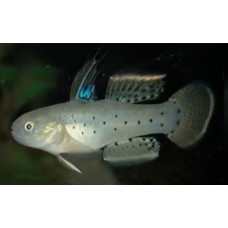Latin name
Stigmatogobius sadanundio
Other names
Gobio caballero, knigth goby.
Identification
Vertebrae: 26-27. Presence of interorbital and postorbital pores, preopercular pores. Longitudinal scales 25-29. Transverse scales posteriorly 8-10. Anteroposterior scales 7-10, reaching the eyes.
Features of fish fins
Dorsal spines (total): 7; Dorsal soft rays (total): 7-8; Anal spines: 1; Anal soft rays: 7-8.
Fish colouring
Body pearly gray with three or four roughly aligned rows of round black spots on sides. Bases of soft dorsal and anal fins with elongated spots and veins (aligned along fin rays). Elongated blackish spot on first dorsal fin between third and fifth dorsal fin rays.
Distribution
Asia: from India, Sri Lanka and the Andaman Islands to Singapore and Indonesia.
Habitat
Freshwater, brackish, benthopelagic, amphidromous, tropical (20°C - 26°C). pH range: 7.0 - 8.0. Range dH: 9-19. Occurs in estuaries and intertidal areas. Prefers freshwater, rarely found in brackish water.
Size
This species can reach a length of 9 centimeters (3.5 inches).
Behavior
If kept in an aquarium with fish of the same species, fights may occur as it is a very territorial fish.
Food and feeding habits
Feeds on small fish and invertebrates, including mosquito larvae.
Reproduction
Laying eggs on cave ceilings. A pair can lay about 1,000 eggs, each of which is attached to the cave ceiling with a thin thread. Both parents care for the brood.
Fishing
This species is not interesting for fishermen.
Relationship with a person
Used in aquariums.
| Classification | |
| Phylum | Chordata |
| Class | Actinopterygii |
| Squad | Gobiiformes |
| Family | Oxudercidae |
| Genus | Stigmatogobius |
| Species | S. sadanundio |
| Features | |
| Conservation status | No information |
| Habitat | Pelagic |
| Life span, years | No information |
| Maximum body weight, kg | No information |
| Maximum length, cm | 9 |
| Sailing speed, m/s | No information |
| Threat to people | Not edible |
| Way of eating | Predator |



